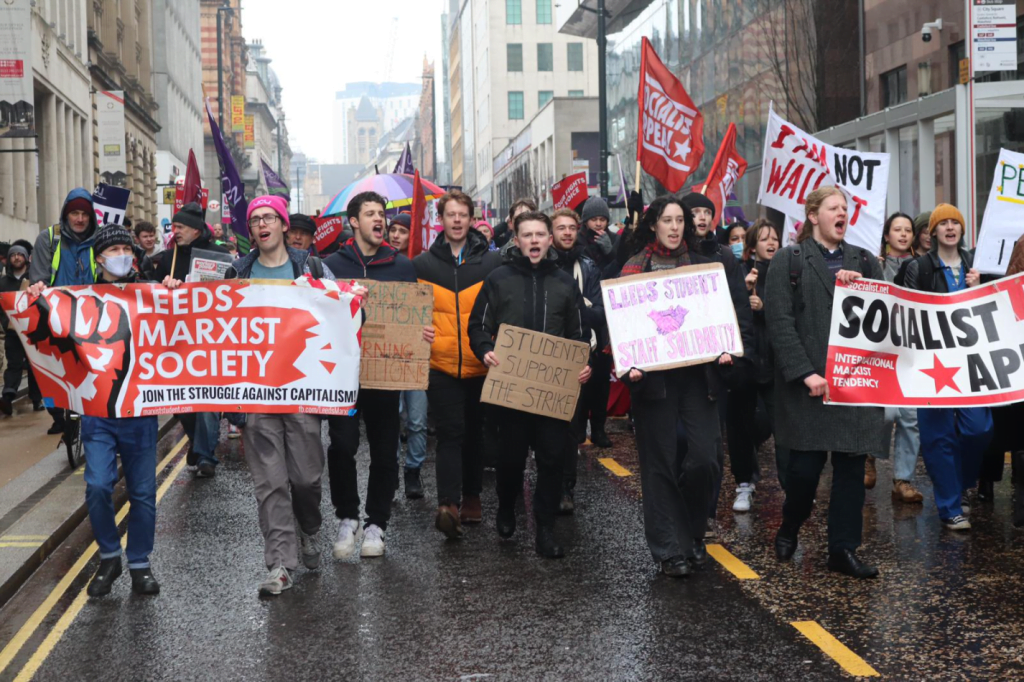The NUS (National Union of Students) called for a walkout on 2 March coinciding with the end of the latest round of UCU strikes. There were four demands for the walkout: full funding for education, accessible education, lifelong education, and democracy in the education system. We fully support these demands.
Marxists argue that we need free education, accessible to everyone throughout their lifetimes, funded by the expropriation of the biggest businesses and banks in society. These businesses have made huge profits off a well-educated population for decades, and big landlords have become rich off exploiting students for rent. We have the wealth in society to fully fund free education, but it’s in the hands of a tiny number of profiteering capitalists. We need to take it off them.
Clearly, students can’t do that on their own. The organised working class holds the power in society, so only by linking up with the workers can students win free education. That’s why coordinating the student strike with the UCU action was such a good idea.
Comrades from the Marxist Student Federation (MSF) enthusiastically threw themselves into building student support for the UCU strikes for several weeks, culminating in the planned walkout on 2 March. On 26 campuses around the country Marxist societies have held meetings for UCU members to explain their strike action to students, we’ve organised roving pickets to support staff on strike, and we hosted rallies on the last day of strike action in several cities around the country, including Sheffield, Birmingham, and Lancaster. In Leeds over 1,200 staff and students joined a demonstration through the city, in which the Marxist society played a key role.
Throughout the last few weeks Marxists have found that students were enthusiastic about the idea of supporting the UCU, and participating in a student strike. Student support on the picket lines was noticeably higher in many places than during the last round of strikes in December.
No doubt this is because the last few years have seen constant attacks on the working class that have hit young people the hardest. This is set to continue with skyrocketing inflation and rent that is barely affordable. Poor mental health support, and an increasingly precarious job market has left students anxious about their futures.
It was therefore a shame that the NUS was unable to capitalise on this mood among students. What was needed were mass meetings of students and staff in every university, with political demands and strategy debated and voted on. This could have been the springboard for extending the struggle to other trade unions on campus, bringing the entire higher education sector to a standstill. Unfortunately the NUS proved unable to organise such a mobilisation.
The NUS-organised student strike was originally billed as a 100,000-strong demonstration through central London. In the end it was a small rally of 200-300 people, which was a disappointment for many of the activists who had worked hard to put it on.
Why did this happen? In the past the NUS mobilised demonstrations for free education that saw tens of thousands of students take part. Today students are in a worse position, and are more angry than before. The wave of rent strikes in universities last year is evidence of the militancy that exists. Despite this, the NUS walkout was unable to meet its potential.
The truth is, the NUS has slowly lost its authority in the student movement over the last few years. This is due to right-wing leaderships dissolving the NUS into an apolitical body. In 2019 reforms were pushed through the NUS conference which slashed 50% of its budget, including most of its campaigning capacity.
Where the Marxist Student Federation (MSF) has taken a lead in organising rallies and marches across the country, our experience shows that a successful march could have been organised by the NUS. For example in Leeds, the call for a demonstration saw an incredible turnout of 1,200 students and workers.
A key factor in the success of the Marxist societies was their preparation. It did not happen spontaneously, or simply by announcing a demonstration and then expecting people to turn up. The Marxist society has built a strong relationship with the local UCU and UNISON branches over the last year. The comrades set up a ‘Leeds Student Staff Solidarity’ (LSSS) group, and organised for its members to be on the picket lines every single day to support the staff.
The comrades organised meetings on the question of free education, against marketisation and the fight against capitalism. UCU and NEU speakers were invited to address these meetings. This found an incredible echo. The key is a fighting programme that connected the question of free education to the fight against capitalism, alongside an established student and worker solidarity network.
The demonstration in Leeds serves as a shining example of the potential that exists across the education sector to fight back. In Sheffield and Birmingham, we saw rallies of a few hundred people, which also reflects the political will that exists to fight.
A new round of UCU strikes has already been announced for the end of March. Now is the time to reflect on these lessons and prepare for the next period of struggle. We must do so by basing ourselves on a fighting socialist programme for free education that unites students and workers.
Report from Leeds

The mood was one of optimism and united action, with workers being extremely grateful that the Marxist Society stood in solidarity, and students inspired by the campaign.
In Leeds, comrades within the Marxist Student Federation helped establish a campaign group called Leeds Student Staff Solidarity (LSSS) during the last round of UCU strikes. This group campaigned in solidarity with the striking members of the UCU at Leeds – and this week, UNISON who have successfully taken strike action against low pay for the first time in nine years!
The LSSS group dedicated its efforts to forging unity between workers and students against the marketisation of our education. Marketisation is responsible equally for the dire working conditions of workers at universities and colleges, as well as the increasingly unaffordable and unacceptable student living standards.
As part of the NUS National Day of Action called for the 2nd of March, comrades in LSSS organised a protest march from the University of Leeds campus through the city centre onto city square in Leeds.
Thanks to building for this alongside the UCU and UNISON, a staggering 1200 workers and students united in protest against the attacks on education and staff conditions!
With due diligence of publicising the event, forming relationships with local union workers, and earning the respect of the education labour movement in Leeds by providing unequivocal solidarity to the workers, the Leeds protest was the largest in the country.
Comrades chanted for the full duration of the march with slogans such as ‘NO CUTS, NO LOSSES – TAKE IT FROM THE BOSSES!’, which was echoed by the crowd for the city to hear.
Once gathered in the city centre, comrades organised for a range of speakers reporting on behalf of the UCU, UNISON, student climate coalition, the LGBTQ+ network, BLM, student doctors and comrades from the MSF who most importantly explained why all these movements are connected through one common enemy – the rotten system of capitalism.
The protest made clear how the consciousness of workers and students is transforming. As Marxists it is our duty to expose that the root cause of austerity, cuts, unacceptable working conditions, dire living standards, and oppression: that all these ills are caused by the capitalist system itself and the greedy profiteering of the ruling class.
As we have shown in Leeds, unshakeable solidarity can be forged between workers and students. United, we will never be defeated!




1 Comment
Connor B. · March 12, 2022 at 4:22 pm
Awesome article comrades! greetings from Concordia University in Montreal!